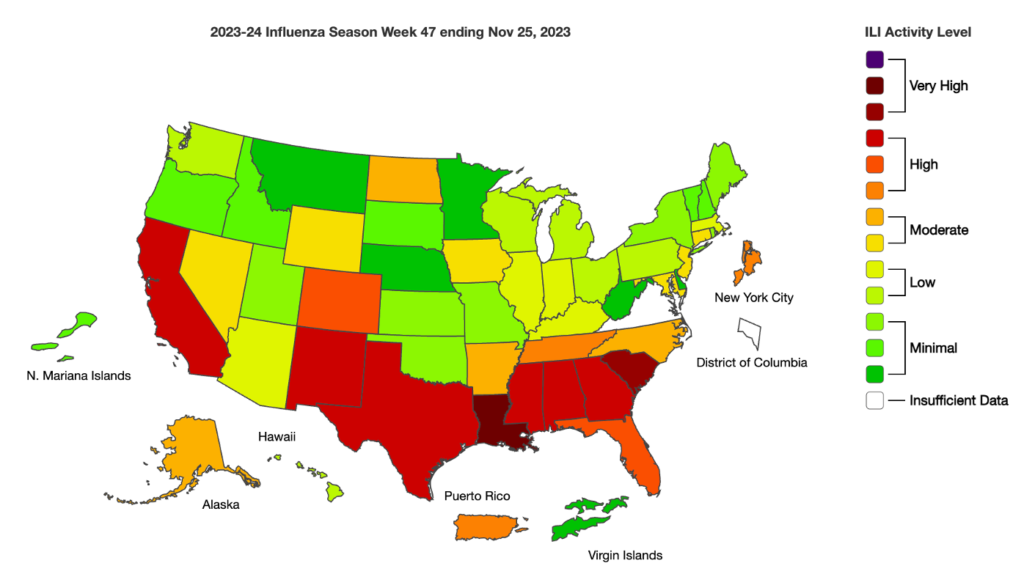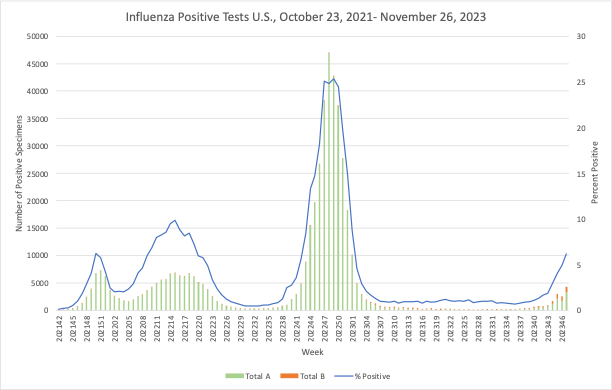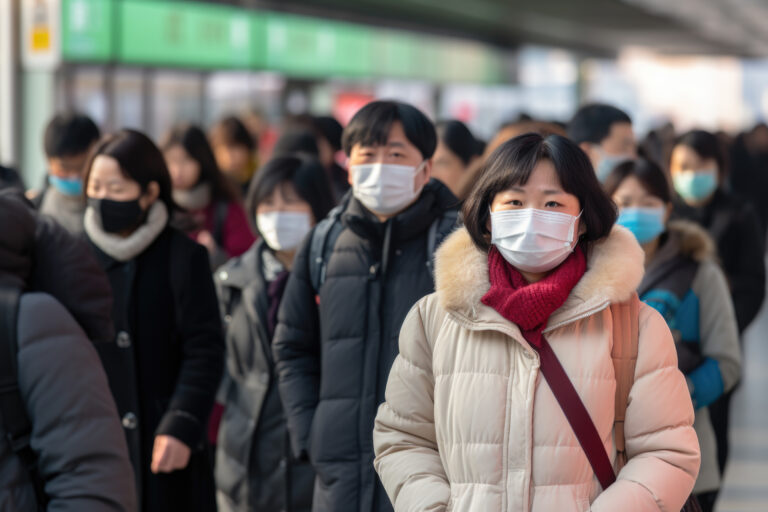There appears to be some hype in the news about respiratory viruses circulating in China. Fears abound of possible cross infection of new outbreaks of influenza and RSV with the still-present mycoplasma pneumonia. China has stated that the virus is under control, but due to a lack of transparency at the start of COVID, concerns have been raised. The reality is that mycoplasma pneumonia (often called “walking pneumonia” due to its mild symptoms) is generally easy to cure, but the Chinese children have been more seriously impacted than usual.
Although it is likely true that the new wave of flu and RSV may put greater pressure on China’s primary medical system, as some attest, there is no indication the viruses being seen in China are from anything unknown or even unexpected. Rather, it tracks with expectations from a population immunity standpoint.
When China shut down for COVID, it completely locked down, imposing travel restrictions, closing highway exits and banning some citizen movement from their homes. With some “Zero Covid” policies lasting for three years, then being abruptly dismantled, it’s no surprise that the virus-naïve population was more susceptible to respiratory infection (such as influenza and RSV), and transmission continues to be higher among China’s people. While we saw similar virus naivety in the U.S. and other countries, it was to a lesser extent, so many seem to have forgotten it to be a normal impact of such shutdowns.
So, while we do not feel that businesses need to be banning their personnel from travel, as mentioned by some news sites, the seasonal rise in respiratory viruses in the U.S. as well as China and other parts of the world, should be seen as a reminder to get your vaccinations (and remind your employees to do so) if you haven’t already. It’s just good health!
COVID Risk Matrix:

Influenza:


There appears to be some hype in the news about respiratory viruses circulating in China. Fears abound of possible cross infection of new outbreaks of influenza and RSV with the still-present mycoplasma pneumonia. China has stated that the virus is under control, but due to a lack of transparency at the start of COVID, concerns have been raised. The reality is that mycoplasma pneumonia (often called “walking pneumonia” due to its mild symptoms) is generally easy to cure, but the Chinese children have been more seriously impacted than usual.
Although it is likely true that the new wave of flu and RSV may put greater pressure on China’s primary medical system, as some attest, there is no indication the viruses being seen in China are from anything unknown or even unexpected. Rather, it tracks with expectations from a population immunity standpoint.
When China shut down for COVID, it completely locked down, imposing travel restrictions, closing highway exits and banning some citizen movement from their homes. With some “Zero Covid” policies lasting for three years, then being abruptly dismantled, it’s no surprise that the virus-naïve population was more susceptible to respiratory infection (such as influenza and RSV), and transmission continues to be higher among China’s people. While we saw similar virus naivety in the U.S. and other countries, it was to a lesser extent, so many seem to have forgotten it to be a normal impact of such shutdowns.
So, while we do not feel that businesses need to be banning their personnel from travel, as mentioned by some news sites, the seasonal rise in respiratory viruses in the U.S. as well as China and other parts of the world, should be seen as a reminder to get your vaccinations (and remind your employees to do so) if you haven’t already. It’s just good health!
COVID Risk Matrix:

Influenza:


Infectious Disease News:
- More than 650 Trichinella infections have been reported in an Argentinian province so far this year. Buenos Aires has confirmed 399 cases. Among multiple outbreaks this year, six were due to the consumption of meat products after domestic slaughter, while the significant incident was linked to contaminated commercially available products.
- Covid and flu cases are predicted to peak over the holiday season in Ontario. Health officials continue to urge individuals to get vaccinated. Only 13% of the eligible population in Ontario has received their updated Covid vaccines this fall.
- The first case of human infection with the H1N2 influenza virus was discovered in the UK. The virus is like one currently circulating in pigs; most cases occur in swine. The patient diagnosed with the disease had mild illness and has now recovered. There was no evidence of person-to-person transmission. There have been a total of 50 human cases of influenza A(H1N2)v reported globally since 2005.
- In India, the flu has claimed 37 lives in the state this year. Most have occurred in Nagpur district followed by Kolhapur and Pune.
- The number of patients in hospital with norovirus was almost triple the number during the same period last winter as of Nov 30th in England.
- The Pan-American Health Organization recently issued an Epidemiological Alert following an increased number of invasive group A streptococcal infection cases, especially in children. As of November 28, 2023, Argentina had reported 93 fatal cases. About half of the 643 cases and over 38% of the deaths involved children younger than 16 years.
- Croatia was struggling to contain a whooping cough epidemic that health officials said on Nov 29th was due in part to a drop in inoculation rates linked to the growth of the anti-vaccine movement. So far in 2023, more than 1,100 whooping cough cases have been reported. Previously about 50 cases per year were reported.
- A never-before-seen virus that causes a malaria-like illness has been detected in Peru. The virus is classed as a phlebovirus, which causes acute feverish illnesses, and can be fatal if it develops into a hemorrhagic fever. This new virus is currently being studied to determine how widespread it is and to identify its transmission capabilities.





